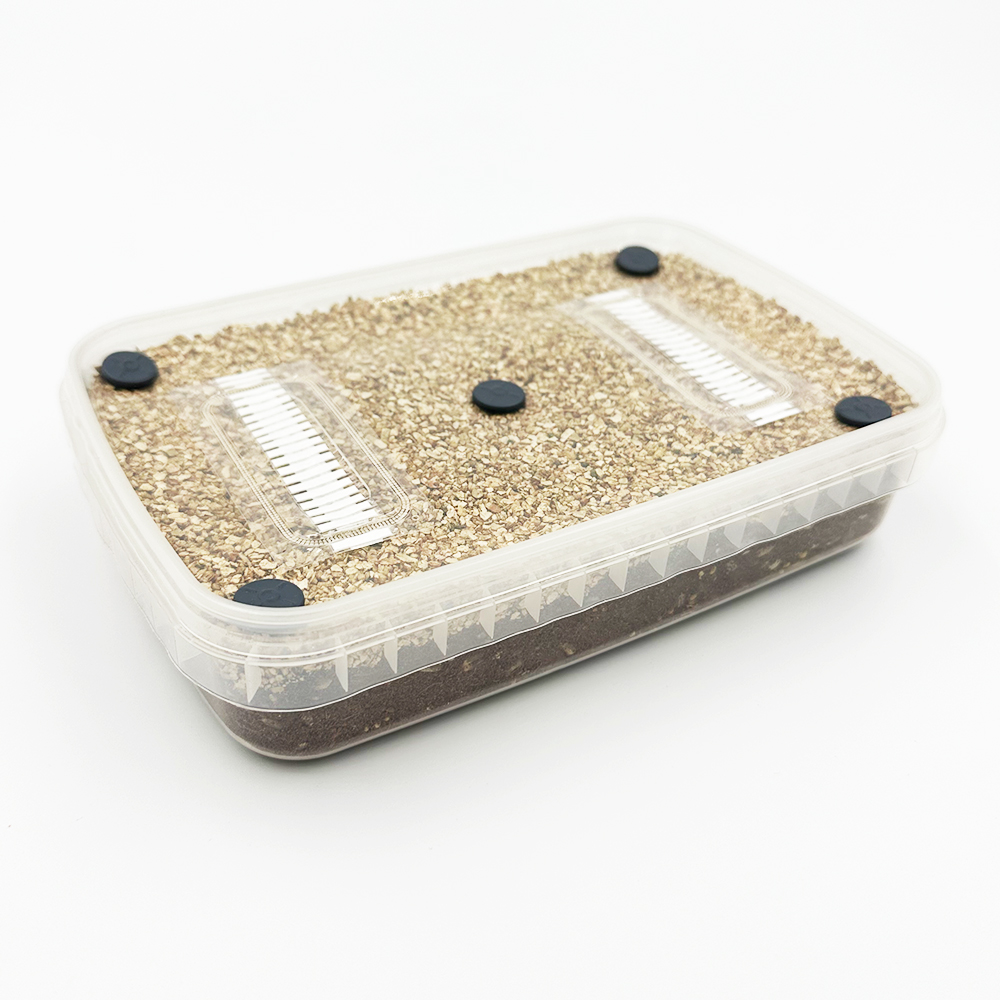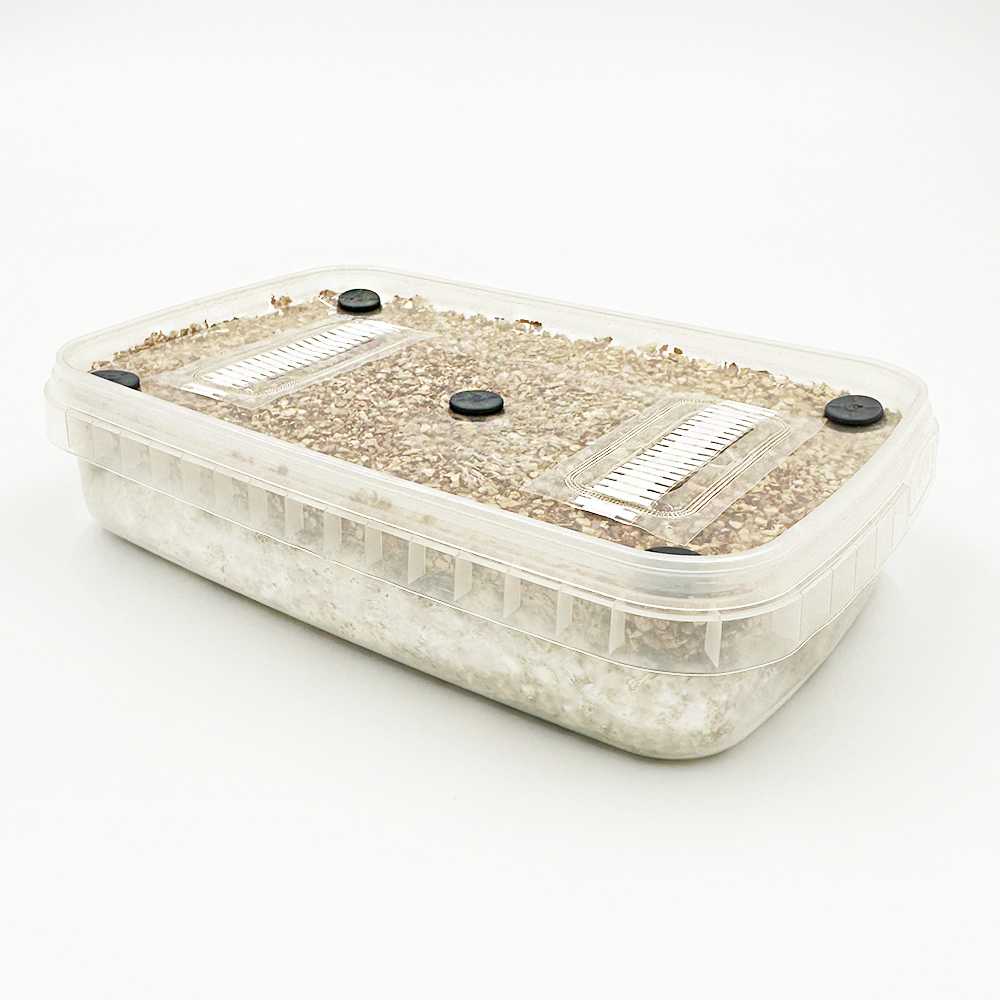Grow Guide for Special MycDrop™ Grow Kit
Follow this comprehensive guide to achieve the best results with your Cylocybe Special MycDrop™ Grow Kit. Each step is crucial for successful cultivation.
From June 2025, we will include a SporeKit™ with each of our grow kits. This will allow you to test your gourmet mushroom spore syringe(s) for contamination before you use the solution on your grow kit. You can find more information here. Please follow this process!
When you’re sure you have clean mycelium growth in your SporeKit™, you can move on to the below instructions and have confidence in providing a good start for your grow…
1. Inoculation of Sterile Cylocybe Special Substrate
Work in a small, clean and draught-free room. We always recommend working within a Still-Air Box when completing inoculations of any product.

Make sure you’re showered with fresh clothes. Clean your hands and forearms with the blue Clinell wipes, then fit your gloves and face mask securely.
Prepare your chosen gourmet mushroom spore/culture syringe for use by screwing in a new sterile needle.
Remove your Mini MycoBox from the bag. It’s now exposed to the open air and potential contaminants – this is where working within a SAB will greatly reduce your chance of contamination.
Clean all of the grey rubber injection ports on the Mini MycoBox lid with a green Clinell wipe. (Depending on when you ordered the kit, you may only have one injection port – This is the latest version of the kit, as it decreases chances of cross contamination between multiple ports). Don’t touch or try to remove the white air filter strips – this is essential.
Distribute 3ml of your gourmet spore or culture solution between all the injection ports – Take care and do not add any more than 3ml in total to your Mini MycoBox.
If you have any solution left and want to store it – flame sterilise the needle until red hot, leave it a few seconds to cool before putting the cover back on and then keep the syringe with needle attached in a cool, dark place – a drawer is ideal. Before using it again, flame sterilise it another time for good luck.
2. Colonisation of Cylocybe Special Substrate
Mycelium is living and needs to breathe, so don’t ever store your Mini MycoBox in an airtight container. The cardboard box it arrived in is an ideal place to now store your colonising Mini MycoBox to keep it clean.

Temperature is so important for success. Being too hot or too cold may result in contamination or slow to no mycelium growth.
Stay between 18-20°C (64-68°F) and try to maintain a consistent temperature, i.e. don’t let the temperature go up and down too much.
Avoid heat mats! They will cause excessive condensation leading to water build-up and an easy pathway for contamination to enter your substrate. Consider building or buying an incubator if you’re struggling to maintain these temperatures – it’s way cheaper than keeping your home heating on all the time and gives much better results too.
In optimum conditions, it will generally take 2-3 weeks for the substrate to reach full colonisation depending on inoculation type (spores or live culture), genetics, etc.
3. Dunking for Humidity and Hydration
When the substrate is fully colonised i.e. completely covered in white mycelium, you are ready to use a method called ‘dunking’ to prepare for fruiting. Do not ever take the lid off your Mini MycoBox before full colonisation.
Fill a container with water deep enough to submerge your colonised substrate (known as a ‘cake’) in. Open your Mini MycoBox and remove the colonised cake – it will be a solid block. Place this in the water and you can use something like a plate to weigh the cake down to stop it floating, as you need it to be fully covered in water at all times. Put a lid on the container or cover it to keep everything clean. Leave your cake submerged like this for anything between 6-24 hours.. depending on how much patience you have! But obviously – the longer you leave it, the better your results will be.
4. Perlite for Maximum Humidity and Hydration
4.1 Enhanced Kit Version Only
If you didn’t opt for the Enhanced version of the kit, skip this step.
Pour your perlite into a strainer and rinse under a tap until it’s soaking wet. When it stops dripping, pour it all into the provided XL Grow Tent. Please cover your mouth and nose when working with perlite – it’s dusty and nasty to work with (take it from us).
5. Place Cake into XL Grow Tent
If you’re using perlite, cut a piece of tin foil slightly larger than your cake and place this on top of the perlite so the cake doesn’t touch it.
After your cake is finished dunking, take it out of the water and give it a rinse under a tap. Allow excess water to drain off and then carefully place it into the XL Grow Tent.
Make sure to fold over the top of your grow tent to keep the humidity in and the dusty nasties out. A little tape might come in handy if it’s not staying closed.
6. The best bit… Fruiting your mushrooms!
Maintain a temperature somewhere between 20-22°C, this tends to be great for many popular species. When the temperature is right, essential levels of humidity will naturally build up inside the grow tent from the water you allowed to soak into the substrate.
You should not mist this kit, unlike some other grow kits you may have seen or used before. The only time you should open your tent is when you’re ready to harvest your mushrooms – opening it even for a few seconds before this is enough to lose humidity and cause growth defects (aborted pins, caps breaking, etc).
Humidity and FAE (fresh air exchange) are extremely important for pinning and healthy mushroom development, as is temperature and light. They will all need to work in harmony.
We suggest cutting a 1cm slit through both sides of the tent, near to the top and placing an electric fan somewhere in the room on low setting. This will create a gentle air current inside the room which will increase FAE inside the grow tent. Your mushrooms will also need light to grow – we recommend indirect sunlight or a 6-7000K LED or fluorescent light a couple of feet away.
If you notice the inside of your grow tent looking dry, there are a few things which can cause this: The environment is too cold so humidity is not developing inside your grow tent, the fan is too close, the slits you cut in the tent are too big (cover excess with tape), grow lights are too close and drying out the substrate… Observe what’s happening and adjust your setup as required – fantastic results depend on it.
After around 3-7 days you’ll begin to see lots of tiny white dots – these are hyphal knots which will develop into primordia, aka mushroom pins… the exciting part! It’ll then only take 4-5 days for them to grow into fully mature mushrooms ready for harvest.
During this time, they’ll let you know if something isn’t quite right – fuzzy mycelium at the base of the mushrooms and/or thin stems are an indication that more FAE is needed so increasing the fan speed or length of the cuts on the bag might be something to try.
Don’t worry about any mushrooms growing around the sides and bottom of the cake, you’ll still be able to harvest them. If you want to give your mushrooms more room to grow next time, consider using a fruiting chamber.
When the veil beneath one of your mushroom caps is about to tear off, this is when you should harvest your first flush. If you don’t get there quick enough, spores will begin to drop from your mushroom caps and make a mess! It’s best to cut the mushrooms off with a clean scalpel or knife, you can also just pull them off but be careful not to damage the substrate too much.
After you’ve harvested all the mushrooms from your first flush, you should dunk your cake again to rehydrate it for round 2! Remember to rinse it and allow excess water to drain off before placing back into your grow tent. It’s really important that you dunk your cake between each flush for best results. If using perlite – you should also pour it into a strainer again and rehydrate it whenever you’re dunking your cake.
7. Additional Resources
We also recommend reading our general troubleshooting guide as it’s full of useful information which will help you solve and avoid problems.
If there’s anything you’re still unsure about and you need some advice on growing your gourmet mushrooms – get in touch! We’re a friendly bunch.
Happy shroomin’ 🍄🟫
Last updated on 03 June, 2025